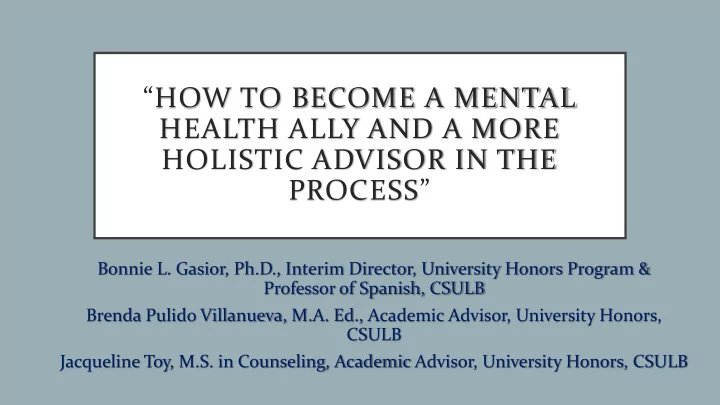

“ HOW TO BECOME A MENTAL HEALTH ALLY AND A MORE HOLISTIC ADVISOR IN THE PROCESS ” Bonnie L. Gasior, Ph.D., Interim Director, University Honors Program & Professor of Spanish, CSULB Brenda Pulido Villanueva, M.A. Ed., Academic Advisor, University Honors, CSULB Jacqueline Toy, M.S. in Counseling, Academic Advisor, University Honors, CSULB
WEBINAR OVERVIEW • MHFA: Who? What? Why? • Risk Factors for Anxiety and Depression • UHP: University Honors Program (also, “Unique, Holistic, Progressive”) • Mental Health and Appreciative Advising Synergy • Resources • Coping and Caring • FAQs • What’s Next?
Image Credit: Vanessa Bancheri
Kuhn, Terry, et. al. “ The Advising and Counseling Continuum : Triggers for Referral”, Nacada Journal , vol. 26, no. 1, 2006, pp. 24-31.
WHAT IS MHFA? “ The first aid offered to someone developing a mental health problem or experiencing a mental health crisis. The first aid is given until appropriate treatment & support are received or until the crisis resolves .” *MHFA is NOT therapy or counseling nor does having certification qualify you to make diagnoses. • Goals of MHFA (“Collaborative care”): • Destigmatize • Give hope • Promote mental health literacy • The course: • Recognize signs & symptoms • Offer and provide initial help and information • Refer the individual to appropriate professional help
STUDENT MENTAL HEALTH IN THE ERA OF COVID-19: ANXIETY AND DEPRESSION Risk factors: • Distressing and uncontrollable events • Stressful or traumatic events • Ongoing stress and anxiety • Illness that is life threatening, chronic or associated with pain • Lack of exposure to bright light in winter (Seasonal Affective Disorder) • Substance misuse, intoxication, withdrawal
Happy Monday, everyone! UHP is starting a new, weekly Mental Health Check-in for our students! Feel free to DM us or leave a comment using one of three hearts! ( 💛💜❤ ) • • • • • • • • • • • • • We recognize the effects Covid-19 can have on your lives. While we hope everyone is doing well, if you’re not, let us know how we can help! Have an amazing week, students! #GoBeach #CSULBHonors #onebeach Adapted from an MHFA instructor by the UHP Team
STUDENT ENGAGEMENT SERIES: • Mindful meditation • Game Night (Jackbox games) • Movie night • Excel workshop • Dance classes • bachata, merengue, etc.
MENTAL HEALTH IN THE CONTEXT OF APPRECIATIVE ADVISING SIX PHASES OF AA ALGEE • Disarm • Assess • Listen • Discover • Give reassurance & • Dream • Design information • Encourage appropriate • Deliver professional help • Don't Settle • Encourage self-help (Bloom et al., 2008) “supportive , positive, dynamic and holistic” (Truschel , Jack. “Does the Use of Appreciative Advising Work?” TLAR , Vol. 2, No. 2, 2008, pp. 7-16.)
• CREATE safe spaces • ASK questions • USE positive language • LISTEN without judgement/purposefully • DREAM/HOPE • DESIGN/ENCOURAGE • DELIVER/ENCOURAGE
FAQ’S • How can I take care of students’ needs when I’m worried or anxious myself? • How should I broach the topic of mental health with my advisees? What if I do/say the wrong thing? • In the same vein, can you give us some examples of language to use when broaching the topic? • What should I do if I reach out and my student doesn’t respond? • How do I work with advisors who don’t/don’t want to understand mental illness?
RESEARCH ON ADVISORS AND MENTAL HEALTH • Academic advisors are acutely aware of the clinical and mental health issues that emerge for students (Kadison & DiGeronimo, 2004). • Students from underrepresented groups (ethnic/racial minorities, LGBTQI, etc.) often face additional challenges and pressures in the academic setting that may impact their psychological well-being (Grant et al., 2014; Hyun, Quinn, Madon, & Lustig, 2009; Mier, Boone, & Shropshire, 2009). • Sharon Rauch’s (2018; Northeastern U.) dissertating examines “how combining counseling and advising affects academic success of students with mental health issues.” Although she suggests training counselors to do basic advising, I think the same could be argued inversely as we reflect on Kuhn’s continuum.
RESOURCES
COPING (YOURSELF) AND CARING (FOR) OTHERS • Stay informed but avoid overexposure to news. • Acknowledge that you need to cope. • Be mindful of how you compensate for lack of control. • Strive to stay in the present moment. Anxiety is oriented toward the future; depression, toward the past. • Take care of your body. • Stay connected, and reach out to others for support.
WHAT’S NEXT? IN THE MEANTIME: MENTAL HEALTH ALLY PROGRAMS: • Check in with your • Get certified! advisees. • • Advocate for trainings Listen on your campus! empathetically. • Advisors’ orientation • Promote mental • As a dedicated training health as a way to within your unit redefine student success!
THANK YOU AND BE WELL! Bonnie Gasior: bonnie.gasior@csulb.edu Jacqueline Toy: jacqueline.toy@csulb.edu Brenda Pulido Villanueva: brenda.pulidovillanueva@csulb.edu
Recommend
More recommend